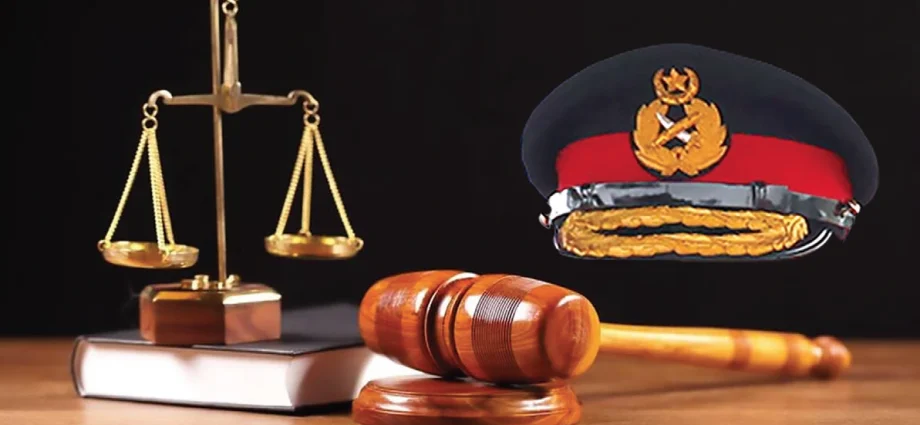The constitutional bench of SC conditionally allows military courts to pronounce verdicts of 85 civilians arrested in 9th May riots case
Constitutional bench says judgments of military courts would be conditional to the top court verdict on the cases pending before it
ISLAMABAD ( WEB NEWS )
The Supreme Court’s constitutional bench on Friday conditionally allowed military courts to pronounce reserved verdicts of 85 civilians who were still in custody for their alleged involvement in last year’s May 9 riots.
In its order on the hearing of the appeals against civilians’ military trial, the constitutional bench said judgments of military courts would be conditional to the top court verdict on the cases pending before it. “The suspects eligible for clemency should be granted it and released, while those who cannot be released should be transferred to civil prisons after being sentenced,” the constitutional bench said.
The bench, led by Justice Aminuddin Khan, heard intra-court appeals challenging military court decisions. The bench also included Justice Jamal Khan Mandokhail, Justice Muhammad Ali Mazhar, Justice Syed Hasan Azhar Rizvi, Justice Musarrat Hilali, Justice Naeem Akhtar Afghan and Justice Shahid Bilal Hassan.
The development came as a seven-judge bench resumed hearing a case pertaining to the trial of more than 100 civilians for their alleged role in attacks on army installations during the riots that followed ex-premier Imran Khan’s arrest on May 9, 2023.
Passing directives at the end of Friday’s hearing, Justice Aminuddin Khan said, “Suspects who can be accorded concessions in their sentences, should be given so and released”. “Suspects who cannot be released should be moved to jails once their sentence has been pronounced,” he added.
Friday’s directives allow military courts to pronounce verdicts, including those already acquitted, in trials that have been pending for more than a year.
During the hearing, Advocate Khawaja Haris Ahmad appeared as the defence ministry’s lawyer. Additional Attorney General (AAG) Chaudhry Amir Rehman was present as the state counsel.
The hearing was adjourned until after the court’s winter break, which would end in January.
At the outset of the hearing, echoing his remarks from Thursday, Justice Mandokhail sought arguments on whether the Pakistan Army Act 1952 sections struck down by the court earlier were in line with the Constitution. “Can the Army Act be amended to bring every person under its jurisdiction?” he asked.
When Justice Mazhar sought the reasons for striking down the PAA sections, Justice Mandokhail remarked, “This aspect should also be kept in mind that the Army Act was formulated before the 1973 Constitution.”
Here, Haris contended that there were “errors” in the apex court’s original verdict, at which Justice Mandokhil took exception: “Do not dishonour a court decision to this extent by calling it erroneous.”
The defence ministry counsel then apologised, saying his words were “not of a legal nature”.
Justice Mazhar then recalled that the bench had Thursday sought details of the May 9 incidents. “Currently, we only have the Corps Commander House matter before us. Let us know if the case is to be limited only till the Corps Commander House [attack],” he said.
AAG Chaudhry Amir Rehman responded that “all details were received earlier this morning”, adding that he would submit them formally in the form of a miscellaneous application.
Here, Justice Hilali wondered what would happen to the trials held under the PAA sections declared unconstitutional by the SC earlier. “Someone must have been sentenced under them before May 9 [incident],” she added.
Haris replied that usually, verdicts issued before the relevant sections were struck down had protection, at which the judge remarked that it would be akin to“prejudice against those suspects“.
At this point during the hearing, Justice Mandokhail said, “No one joins the army by force, but of their will. Those joining the army know that the Army Act would be applicable to them.
“Under the Army Act, one does not have their fundamental rights. The Army Act was constituted for the rules and discipline of employment in the army,” he added.
The defence ministry lawyer stated, “No one joins the army with the intention of crime. The fundamental rights are revoked upon committing a crime.”
Justice Mandokhail then asked whether the court would be limited to the appellant’s request when hearing an appeal. “Can the court also review other aspects of the decision?”
Justice Aminuddin observed that “respondents could be limited to their objections but not the court”, to which Justice Mandokhail said he wanted to be satisfied since it was a serious matter. ۔ Here, Haris contended that if the Constitution’s Article 83A “did not provide fundamental rights, then it could not be challenged in a military court”.
“The matter under consideration here is not of fundamental rights but of civilians and non-civilians,” Justice Hilali noted. Justice Mandokhail asked whether the counsel did not trust civilian courts while Justice Aminuddin asked him how much more time he needed for his arguments.
Haris replied he would require “some more time” for his arguments, at which Justice Aminuddin said the hearing was being adjourned until the winter break was over.
“It is hoped that the case of military trials will conclude in January. Once this case is decided, we will fix for hearing the petitions against the 26th Amendment for January’s second week,” the judge stated. “We have a lot of cases in the pipeline, including those on the 26th Amendment.
Subsequently, the bench allowed military courts to announce the reserved verdicts on the condition that they would be subject to the apex court’s final decision on the ICAs. The hearing was adjourned until the first week of January.

